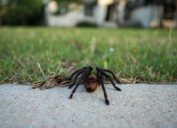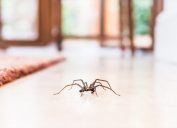If You Hear This Sound, You Could Have a Hairy Spider in Your Yard
Listen for this sound coming from a pile of leaves.

By the time you realize there's a spider in your presence, it's usually too late—the creature is right next to you, or maybe there are too many to count. But while you might spot spiders out of the corner of your eye, chances are you're not going to be able to hear their tiny steps. There is one spider, however, that makes its presence known by sound, especially in the fall, during mating season. Experts say if you hear this sound in your yard, there's a good chance you have a large, hairy spider on your hands. Read on to find out what to listen for.
RELATED: The No. 1 Sign There's a Tarantula in Your Home, Experts Warn.
If you hear leaves rustling, it may be a wolf spider.
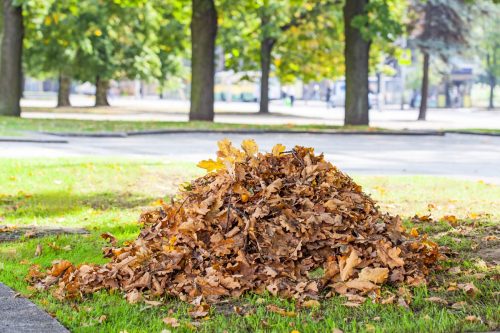
As we get closer to autumn and the weather turns cooler, the leaves will fall and make the perfect accommodation for a handful of critters, including wolf spiders. On Sept. 13, Jim Dill, pest management specialist with University of Maine Cooperative Extension, told the Bangor Daily News that fall is mating season for wolf spiders. Wolf spiders make noise all year, but during mating season, they take it up a notch. The spiders rub their legs together in a pile of dry leaves to get attention. "The rustling of the leaves helps them make more noise," Dill explained.
Although humans can hear the sound that comes from wolf spider's legs, other wolf spiders likely can't. They don't have standard ears, so it's assumed they can't pick up airborne sounds. Research out of the University of Cincinnati from 2015 found that in order for the female wolf spiders to feel the vibrations, they need to both be standing on a surface that can vibrate, such as dry leaves.
RELATED: If You're Not Cleaning This, You're Inviting Spiders to Your Home.
Wolf spiders also make a hissing or purring noise.
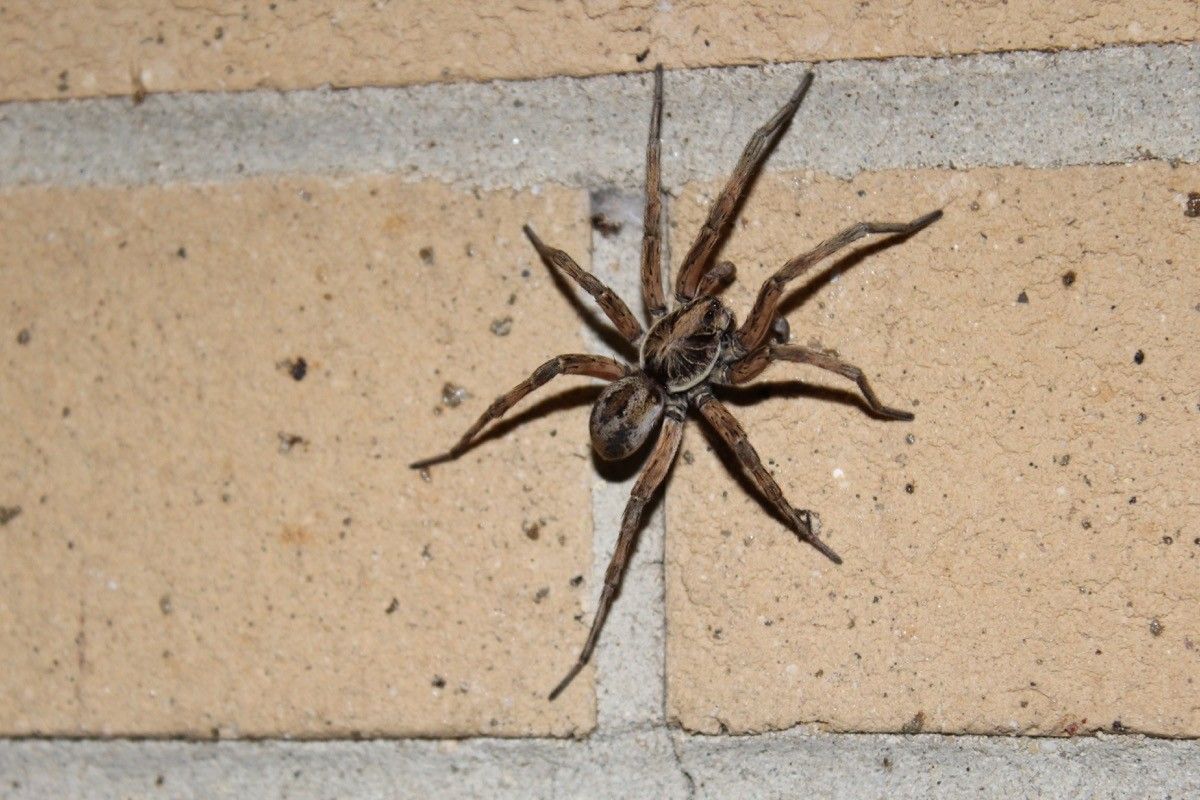
While some experts refer to the sound wolf spiders make as a hiss, others believe it's more of a purr. However, experts agree wolf spiders are a noisy bunch. The noise comes from strigulation, or rubbing their front legs together, similar to crickets. The sound can be used as a defense strategy or, for male spiders, a mating behavior. "Those front legs have hairs that are best compared with Velcro, with little hooks on the end," Dill explained. "Some people say it sounds like a hiss when they hear it."
Experts believe the sound is simply a side effect of their legs rubbing together, which is meant to send out mating vibrations. "We think this airborne sound is primarily a byproduct. As far as we can tell, they may not deliberately be producing a sound," Alexander Sweger, PhD, who presented the University of Cinncinati study, told Live Science.
You shouldn't step on wolf spiders.
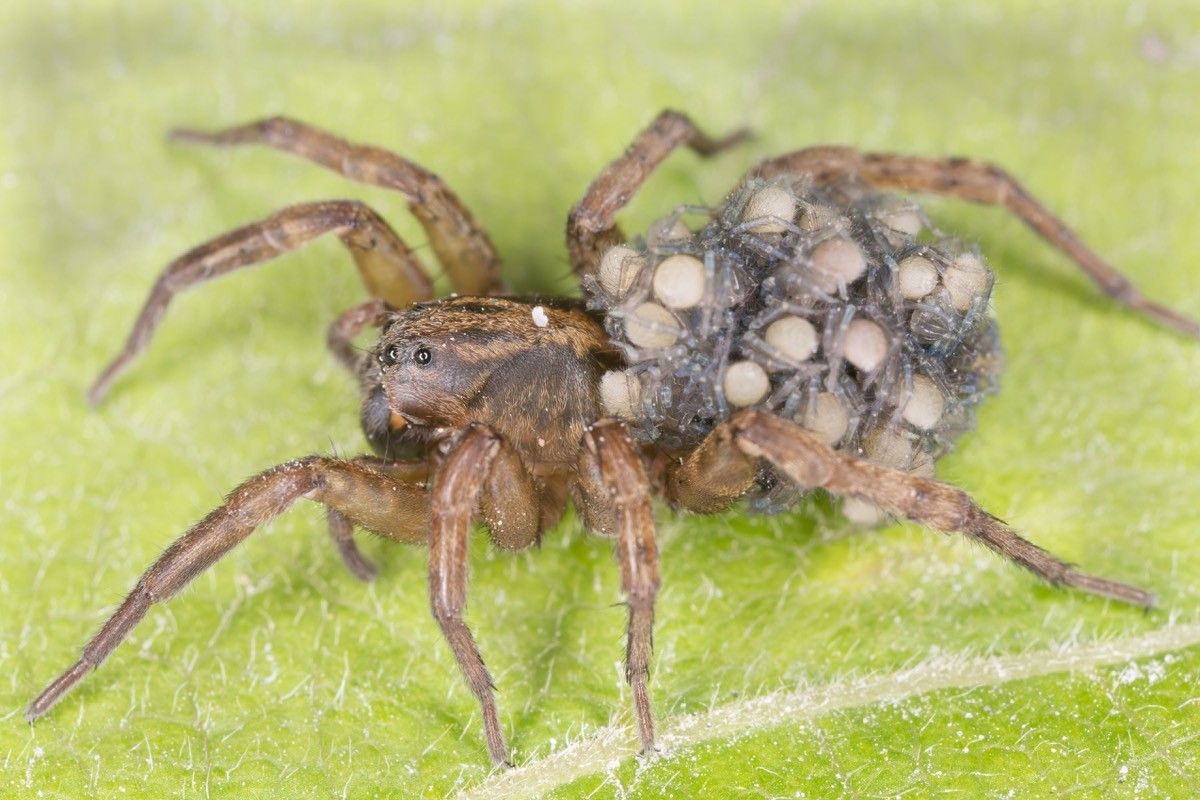
You may come across more wolf spiders in the near future, when fall leaves are littering your yard. The Bangor Daily News notes that as it gets colder, spiders of any kind may also seek warmth and food, leading them to enter your home. If you find a wolf spider, experts urge you to avoid your instinct to squish it. Pest control company Terminix warns that if the spider you stomp on happens to be a female carrying eggs, the impact could release hundreds of spiderlings in your home. The pest control company advises you to trap a wolf spider with glue boards, or use a cup and paper to then release it outside.
RELATED: For more news on spiders to avoid, sign up for our daily newsletter.
Wolf spiders do have venom.

Another reason you should be careful when handling wolf spiders is their venom. A wolf spider is as frightening as it sounds, with its hairy legs, big body, and venomous bite. Dill warned that wolf spiders can be aggressive toward humans if they feel threatened or are manhandled.
"The wolf spider does have a venom it injects into its prey to dissolve it to make a nice wolf spider smoothie to suck in," Dill said. He explained that in humans, the venom could cause a reaction, especially in those that are allergic. More importantly, Dill noted that because wolf spiders feed on a variety of insects and spend a lot of time on the ground, their mandibles are pretty dirty. "There can be a danger of secondary infection" following a bite, Dill continued. These spiders prefer to scurry away, but if they feel cornered, they will get on their hind legs and wriggle their front legs at you.
RELATED: If You Live Here, Prepare to See Thousands of Tarantulas, Experts Say.
